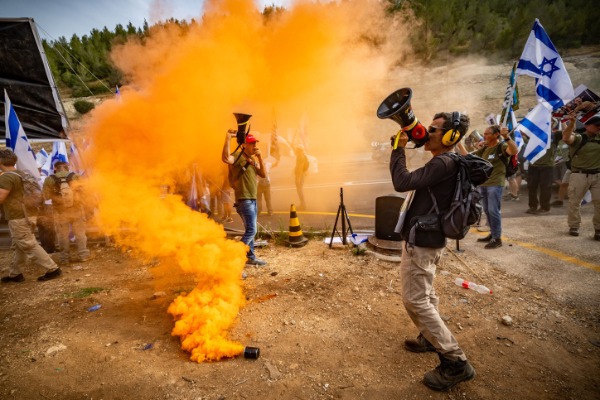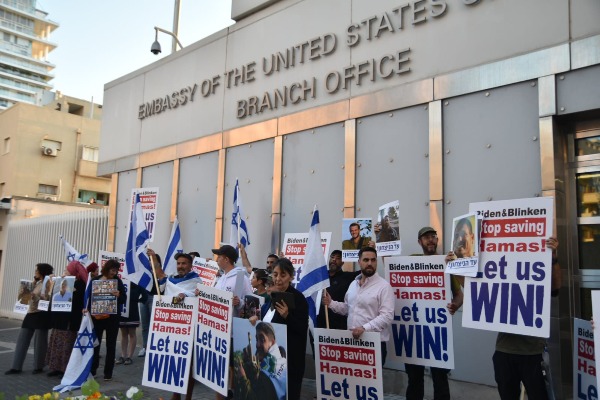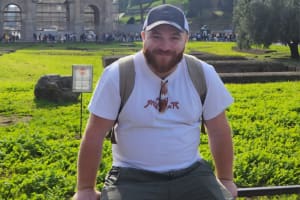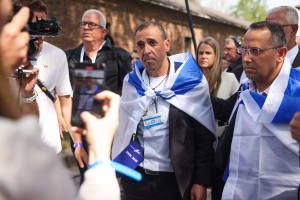Who is protesting in Israel these days and why?
Anti-government protests dominate headlines while other activist groups take to the streets to exert pressure on decision-makers

Anti-government protests dominate headlines while other activist groups take to the streets to exert pressure on decision-makers The images of protesters blocking main roads have been a frequent sight across Israel in the months predating the Oct. 7 massacre. Now, even though most Israelis are united around the government's war objectives, many of them are, once again, taking to the streets to exert pressure on decision-makers.
An overwhelming majority of Israelis agree that 'the day after' the war should see the destruction of Hamas, the return of all remaining hostages, and the elimination of Gaza as a threat to Israel. However, the disagreement among various groups centers on the most effective strategies to achieve these goals and how to prioritize them.
Families of Israeli hostages, fallen soldiers and victims of the Oct. 7 terror attack are a microcosm of Israeli society. Therefore, many of them often participate in different protests and are represented by the various groups behind them.
Anti-government protests
Since the beginning of the war, the most prominent group to mobilize on the streets has been advocating for early elections. On Monday, opposition groups announced a national protest day, known as a “Day of Disruption.” It includes rallies around Jerusalem, as the Knesset opens for its summer session, as well as convoys of vehicles and marches blocking roads.
The participants are generally the same ones who led the anti-government protests at the height of the judicial reform dispute that tore Israeli society apart. Now the “Kaplan Force” and “Brothers and Sisters in Arms” (Achim Laneshek) are applying pressure on War Cabinet Minister Benny Gantz to act to topple the unity government he is currently part of. On Saturday, Gantz delivered an ultimatum to Prime Minister Benjamin Netanyahu and threatened to quit his coalition if his six demands were not met by June 8. At the same time, opposition leader Yair Lapid joined the protesters and urged Gantz to withdraw his National Unity party from the government immediately.
These protesters have made unseating Netanyahu their top priority. In general, many of them support an end to the war in Gaza in exchange for the release of hostages, while the prime minister would theoretically agree to a temporary pause in the fighting. In other words, not at any cost.
In addition, the protests also reflect a strong opposition to another hot-button issue on the line: Netanyahu’s push for legislation to enlist members of the ultra-Orthodox community into the Israel Defense Forces. They claim that the proposed outline for the Draft Law, initially promoted by Gantz in 2022, still gives too many exemptions to a sector that traditionally hasn’t paid its “fair share.”

These protesters consider unseating Prime Minister Netanyahu as their top priority. In general, many of them support an end to the war in Gaza in exchange for the release of hostages, while the Prime Minister would theoretically agree to a temporary pause in the fighting. In other words, not at every cost.
In addition, the protests also reflect a strong opposition to another hot button issue on the line – Netanyahu’s push for legislation to enlist members of the ultra-Orthodox community into the Israel Defense Forces. They claim that the proposed outline, initially promoted by Gantz in 2022, still gives too many exemptions to a sector that traditionally hasn’t paid its “fair share.”
Hostage Square
Protests in Tel Aviv Hostage Square have one main goal: To make sure that the plight of the Israeli hostages in Gaza is at the forefront of every national and international discussion about the war and to raise awareness of the urgency of their deteriorating situation. Even though some speeches delivered in these rallies often carry political undertones, protests of this kind, organized by the Hostage and Missing Families Forum, are generally much less political in nature compared to other ones.
On Saturday, Israeli singer Eden Golan who won the No. 5 spot with the song "Hurricane" at this year's Eurovision Song Contest, performed the original song entry “October Rain,” without the revisions the European Broadcast Union required to be eligible for the contest. Families of hostages stood behind her on the stage holding images of their missing loved ones for more than 220 days. The German Ambassador to Israel gave a powerful speech in Hebrew, and host Eylon Levy – a former Israeli government spokesperson – called for global attention urging citizens of the world to call on Hamas to “Let them go.”
Right-wing protests
Supporters of the Israeli government have also taken to the streets in protest throughout the war on several occasions. They have mainly called on the government to intensify the war against the Hamas terrorist organization, expand the operation in Rafah despite American opposition, and not cave into a hostage release deal at any cost, including the one that would leave Hamas in power. They demand a “total victory” from the government.
These demonstrations are often organized by the Tikva Forum, a union of hostage families, the Gvura Forum – a union of bereaved families – and the Im Tirzu right-wing activist movement.
Some of their rallies have taken place outside the U.S. Embassy Branch Office in Tel Aviv, where protesters held signs that read, “Biden and Blinken stop saving Hamas! Let us win!”

Humanitarian aid protests
The government’s policy to facilitate as much humanitarian aid into Gaza for Palestinian civilians is not very popular among the public. Israelis grow frustrated with the fact that more than 530,000 tons of aid have entered Gaza since the beginning of the war – an enemy zone that still holds 128 hostages and where the population is still widely supportive of the atrocities Hamas terrorists committed on Oct. 7.
Only a few Israelis, however, have taken controversial action to express their strong dismay. In recent days, right-wing activists blocked several aid trucks that were making their way to Gaza, crossing through West Bank checkpoints. Some trucks looted and one was reportedly set on fire.
According to Israeli media reports, the Tzav 9 activist group was behind the initiative, as well as other protests outside UNRWA’s offices in Jerusalem. The White House has condemned the vandalism of the aid trucks, calling their actions "a total outrage."

The All Israel News Staff is a team of journalists in Israel.
You might also like to read this:















